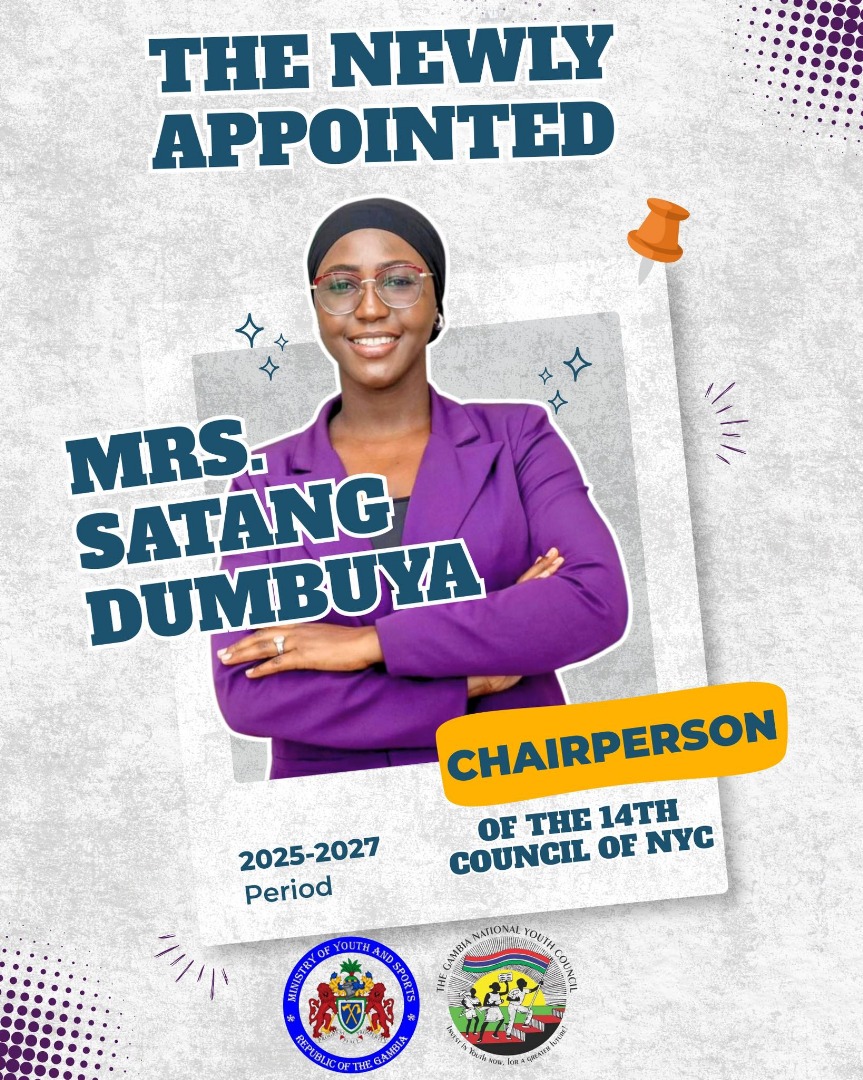
I extend my warmest congratulations to the newly elected youth leaders, especially the Chairperson Satang Dumbuya and Female Representative Mariama Cham. These young women have distinguished themselves through sterling youth work, clarity of purpose, and extraordinary courage. They have been a personal source of inspiration for me, and I am confident that they will bring renewed energy, integrity, and vision to the National Youth Council (NYC).
In welcoming this new leadership, it is necessary to confront the dire and persistent realities facing Gambian youth. The Gambia Labour Force Survey 2025 reveals disturbing levels of unemployment. A huge number of young people remain not in education, employment, or training (NEET). The tragedy of irregular migration continues to rise, consuming lives and tearing families apart, which is further aggravated by the increasing number of deportations of youths from Europe and America. Drugs, crime, and violence are taking a growing toll on our young population.
While universities and TVET centres exist, accessibility remains hindered by high fees and inhibiting factors. Youth socioeconomic initiatives remain narrow in scope, with critical enabling structures absent. There are no youth investment banks, the macroeconomic environment remains hostile, taxes are high for youth entrepreneurs, and incubation centres are few and poorly supported. Rural youth remain the most disadvantaged as they remain cut off from opportunities readily available in urban centres, not least internet services.
Sporting facilities across the country remain inadequate. The national stadium lies dormant, while mini stadiums are poorly equipped. Young people in the performing arts face enormous barriers due to lack of theatres, recording studios, arts schools, competitions, and state support. For years, young Gambians have gathered at NAYCONF to produce solid recommendations, yet these are routinely ignored by the State. These realities demand serious attention from the new youth leadership.
For too long, the national youth budget has been unjustifiably low. If budgeting is a reflection of national priorities, then the underfunding of youth and sports reveals a government that does not place the youth at the centre, despite proclaiming them the “cream of society” and “leaders of today and tomorrow.” The new youth leaders must address this issue.
The issue of young women in the Gambia particularly concerns me as they continue to face layered and persistent challenges that limit their full participation in national development. Despite remarkable strides by a new generation of female leaders, sexual and gender-based violence (SGBV) remains a pervasive threat, both in public and private spaces. Many young women suffer harassment, abuse, and exploitation at work, in schools, and even within their communities with limited access to justice or psychosocial support.
Early marriage and teenage pregnancy continue to derail the education and aspirations of countless girls, while gender stereotypes and patriarchal norms restrict women’s leadership and participation in decision-making. The new youth leadership must therefore prioritize the protection, empowerment, and inclusion of young women, ensuring that SGBV is addressed not as a private issue but as a national crisis requiring urgent, coordinated, and sustained response.
Equally urgent is the condition of youth with disabilities, who remain among the most marginalized groups in the country. Despite the Persons with Disabilities Act 2021, young people living with disabilities continue to face structural barriers to education, employment, and social participation. Public facilities and institutions as well as private businesses remain largely inaccessible as discrimination and stigma persist, and opportunities for skills training or decent work are severely limited.
The new Youth Council must ensure that the inclusion of persons with disabilities is mainstreamed across all youth programs, moving beyond tokenism to genuine empowerment and representation. True youth development will only be achieved when every young person regardless of gender, ability, or background can live with dignity, equality, and opportunity.
The new leadership must also review the National Youth Policy and the Youth Bill to strengthen the independence of the NYC, shield it from political interference, and position it as a proactive, rights-driven institution. An empowered, independent Youth Council is essential to protecting young people from systemic injustices including police brutality, arbitrary arrest, detention, and prosecution for exercising their constitutional rights to freedom of assembly.
Despite these challenges, the moment presents immense opportunities. Gambian youth today are more engaged, more confident, and more participatory than ever before. Across the country, dynamic youth groups and leaders are shaping development, defending rights, and influencing governance in unprecedented ways. The Youth Council must seize this momentum by supporting, strengthening, and expanding these positive forces.
I welcome the new youth leaders and urge them to adopt a holistic, bold, and transformative approach to youth development and youth rights in the Gambia. They have my full support as they embark on this important mission.
For The Gambia, Our Homeland


